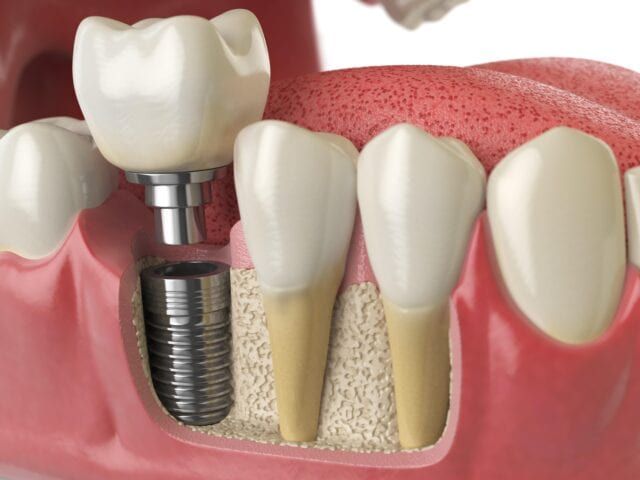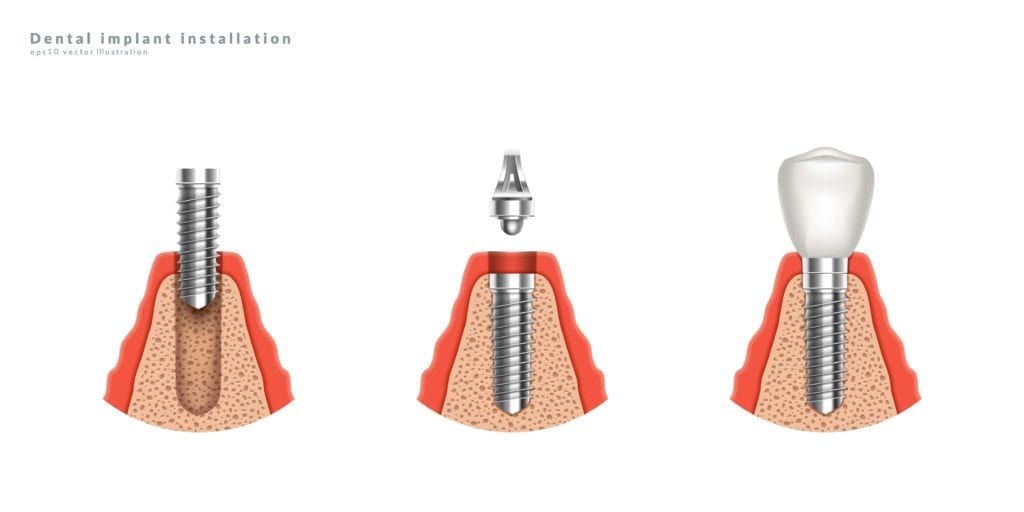Dental implants have revolutionized the field of restorative dentistry, offering a permanent and natural-looking solution for individuals with missing teeth. As this remarkable dental procedure gains popularity, it’s only natural that questions arise. If you’re considering dental implants as a solution to restore your smile and oral functionality, you may find yourself pondering common queries such as “What are dental implants?” or “Are dental implants painful?” In this comprehensive blog, we embark on a journey to demystify the most frequently asked questions about dental implants. Whether you’re curious about the procedure, candidacy, cost, or long-term outcomes, join us as we unravel the mysteries surrounding dental implants and empower you with the knowledge needed to make informed decisions about your dental health. Let’s dive in and discover the answers to these intriguing questions together.
What are dental implants?

Dental implants are artificial tooth roots that are surgically placed into the jawbone as a means of replacing missing teeth. They are typically made of biocompatible materials, most commonly titanium, which allows them to fuse with the surrounding bone through a process called osseointegration. This fusion creates a strong and stable foundation for the attachment of prosthetic teeth, such as crowns, bridges, or dentures. Dental implants are designed to look, feel, and function like natural teeth, providing a long-lasting solution for individuals with missing teeth. They can restore the ability to chew, speak, and smile with confidence, while also preserving the health and integrity of the jawbone.
How do dental implants work?
Dental implants function by mimicking the structure and function of natural teeth. Once the implant is placed and fully integrated with the jawbone through osseointegration, it provides a stable and durable foundation for the attachment of a prosthetic tooth or restoration. Here’s how dental implants function:
- Stability and Support: Dental implants act as artificial tooth roots firmly anchored within the jawbone. They provide stability and support for the prosthetic tooth, preventing it from shifting or slipping while biting, chewing, or speaking. This stability allows for natural and comfortable functioning of the tooth replacement.
- Bite Force Distribution: Dental implants distribute the bite force evenly across the implant and the surrounding bone, just like natural teeth. This helps prevent excessive stress or strain on the neighboring teeth and jawbone, ensuring a balanced and healthy bite.
- Preservation of Jawbone Health: When a tooth is lost, the underlying jawbone may start to deteriorate over time due to lack of stimulation. Dental implants stimulate the jawbone through the process of osseointegration, promoting bone growth and preventing bone loss. This helps maintain the integrity and volume of the jawbone, preserving facial structure and preventing potential complications associated with bone loss.
- Improved Chewing and Speaking Abilities: Dental implants restore the ability to bite and chew with strength and efficiency. They provide a secure and stable base for chewing forces, allowing individuals to enjoy a wide range of foods without restrictions. Additionally, dental implants support clear speech by preventing slippage or movement of the prosthetic teeth.
Who is a good candidate for dental implants?
A good candidate for dental implants is typically someone who has sufficient jawbone density to support the implant and healthy gums free from periodontal disease. They should be in good overall health, without uncontrolled chronic conditions that may impact the success of the treatment. Candidates should be committed to maintaining proper oral hygiene and willing to follow a thorough oral care routine. Non-smokers or those willing to quit smoking before and after the procedure are generally preferred. Specific tooth replacement needs, whether for a single tooth or multiple teeth, should be present. Ultimately, a dental professional will conduct a comprehensive evaluation to determine a person’s suitability for dental implants, considering their unique oral health, medical history, and individual circumstances.
What is the dental implant procedure like?
The process of getting dental implants typically involves several steps:

- Evaluation and Treatment Planning: Before the implant placement, a thorough examination is conducted by a dental professional. This may include dental imaging (X-rays, CT scans) and a review of your dental and medical history. Treatment planning involves determining the number of implants needed and designing a personalized treatment approach.
- Implant Placement: The dental implant procedure is usually performed under local anesthesia to ensure patient comfort. A small incision is made in the gum tissue to expose the jawbone, and then a hole is carefully drilled to accommodate the implant. The implant, which resembles a small screw, is precisely inserted into the jawbone.
- Osseointegration: After the implant is placed, a process called osseointegration occurs. Over a period of several weeks to months, the bone surrounding the implant fuses and integrates with its surface, providing stability and strength. This process is essential for the long-term success of dental implants.
- Abutment Placement: Once osseointegration is complete, a minor surgical procedure is performed to attach an abutment to the implant. The abutment serves as a connector between the implant and the prosthetic tooth or restoration.
- Restoration Placement: After the gums have healed and the abutment is in place, an impression of the mouth is taken to create a custom-made dental crown, bridge, or denture. This restoration is designed to match the color, shape, and size of your natural teeth and is securely attached to the abutment, completing the dental implant process.
Once the dental implant is fully integrated and the restoration is in place, it functions and feels like a natural tooth. Regular oral hygiene practices, including brushing, flossing, and routine dental visits, are essential for maintaining the health and longevity of dental implants.
Are dental implants painful?
The dental implant procedure itself is typically performed under local anesthesia, ensuring that patients are comfortable and experience minimal pain or discomfort during the surgery. The area around the implant site is numbed, so you should not feel any pain during the placement of the implant itself. However, it’s normal to experience some mild discomfort, swelling, or bruising in the days following the procedure. This can be managed with over-the-counter pain medications or prescribed pain relief, if necessary. The level of discomfort varies from person to person, but it is generally manageable and subsides as the healing progresses. Your dental professional will provide specific instructions on pain management and can address any concerns you may have regarding pain or discomfort during the implant process.
What is the recovery process like after getting dental implants?
The recovery process after getting dental implants involves several stages, and the specific timeline may vary depending on individual circumstances. Here’s an overview of what to expect during the recovery period:
- Immediately After the Procedure: Some discomfort, swelling, and minor bleeding around the implant site are common immediately after the surgery. Applying an ice pack to the area and taking prescribed or over-the-counter pain medications can help manage these symptoms.
- Healing and Osseointegration: Over the next few weeks to months, the implant undergoes a process called osseointegration, where it fuses with the jawbone. During this time, it is important to follow post-operative instructions provided by your dentist, such as maintaining good oral hygiene, avoiding hard or chewy foods, and attending follow-up appointments.
- Temporary Restoration (if applicable): In some cases, a temporary crown, bridge, or denture may be placed during the healing period. This helps maintain aesthetics and functionality while the implant integrates with the jawbone. It is essential to follow any guidelines provided for care and maintenance of the temporary restoration.
- Placement of Permanent Restoration: Once osseointegration is complete, and the implant is fully integrated with the jawbone, a final impression is taken to create a custom-made permanent restoration. This could be a crown, bridge, or denture, depending on the individual case. The permanent restoration is then securely attached to the implant.
- Ongoing Maintenance: Regular dental check-ups and proper oral hygiene practices are crucial for the long-term success of dental implants. Brushing, flossing, and using antimicrobial mouth rinses as recommended by your dentist will help maintain the health of the implant and surrounding tissues.
Throughout the recovery process, it’s important to communicate any concerns or unusual symptoms with your dental professional. They will monitor your progress, provide guidance, and ensure that the implants are healing properly. Following the post-operative instructions and maintaining good oral hygiene habits will contribute to a smooth and successful recovery after getting dental implants.
How long do dental implants last?

With proper care and maintenance, dental implants have the potential to last a lifetime. Dental implants are designed to be a durable and long-lasting solution for tooth replacement. The longevity of dental implants can be influenced by various factors, such as oral hygiene habits, lifestyle factors, overall health, and whether someone grinds their teeth.
While dental implants have a high success rate and long lifespan, occasional complications can occur. These may include infection, implant fracture, or damage to the restoration. Regular follow-up visits with your dental professional are crucial to monitor the health of your implants and address any concerns or issues promptly.
It’s important to note that individual experiences may vary, and the lifespan of dental implants can be influenced by several factors. Consulting with a dental professional who can evaluate your specific case and provide personalized guidance is essential for maximizing the longevity of your dental implants.
In Conclusion
In conclusion, dental implants have become a popular and effective solution for individuals with missing teeth, offering both functional and aesthetic benefits. The most commonly asked questions regarding dental implants revolve around understanding the implant procedure, candidacy, pain levels, and longevity. By addressing these questions, we have shed light on the nature of dental implants and the factors that contribute to their success. It is crucial to consult with a dental professional for personalized information and guidance tailored to your specific needs and circumstances. Dental implants can significantly enhance your oral health, restore your smile, and improve your quality of life. With the right information and proper care, dental implants can provide a long-lasting and satisfying tooth replacement solution.

